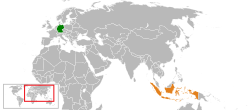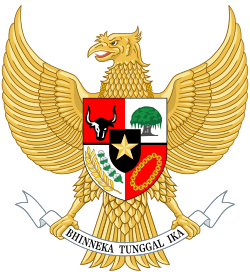Germany–Indonesia relations
Germany–Indonesia relations officially started in 1952 when the diplomatic relation were established,[1] however the relations between the people of Germany and Indonesia has stretched back to 19th-century, when numbers of German nationals migrated to Dutch East Indies.[2]
 | |
Germany |
Indonesia |
|---|---|
Germany has an embassy in Jakarta while Indonesia has an embassy in Berlin. In the early 21st Century, the bilateral relations between the two nations are notable as both holds significant geopolitical influences in each region, Germany is the largest economy in the European Union, and Indonesia is the largest economy in ASEAN.[1][3] Between the both nations have severely concerned about an among international helps as well as the humanitarian response to the December 2004 Indian Ocean tsunami, which claimed the lives of 540 Germans and many more thousands are wounded. Both nations are the member of G-20 major economies.
According to a 2013 BBC World Service Poll, 60% of Indonesians view Germany's influence positively, with only 21% expressing a negative view, one of the most favorable perceptions of Germany in Asia Pacific after South Korea's and Australia's view.[4]
History
The relations between people of Germany and Indonesia was commenced during 19th-century colonial Dutch East Indies. Indonesian painter Raden Saleh (1807-1880) spent some times in Germany and his works influences the local art scene. On the other hand, numbers of German scientists and artists took interest in Indonesia. Such as the Prussian geographer Franz Wilhelm Junghuhn spent most of his work studying the geography and geology of Indonesia. The German painter Walter Spies (1895-1942) settled on the island of Bali and his works influenced local art.[2] President B.J. Habibie studied and spent most of his life in Germany.
The bilateral diplomatic relations officially established in 1952 when Indonesia opened a representative office in Bonn for Federal Republic of Germany, and an embassy in 1976 in East Berlin for German Democratic Republic.[1]
During official visit to Indonesia in December 1, 2011, Federal President Christian Wulff and his counterpart, Indonesian President Susilo Bambang Yudhoyono, identified five key sectors of strategic partnership between Germany and Indonesia; trade and investments, health, education, technology research and innovation, and defense.[1]
Economic relations
Currently there are around 300 German companies operating in Indonesia. In 2012, the overall volume of trade reaching USD 7.24 billion. Germany’s main exports to Indonesia were machinery, chemical products, communications technology, electricity equipments, electronic components, metals, motor vehicles, and pharmaceuticals. While Indonesia’s main exports to Germany were food, vegetable oils, textiles, agricultural produce, electronic devices, footwear and mineral ores.[2]
Germany has supported a development cooperation program with Indonesia for many years. For thirty years between 1967 and 2007, Germany provided aid to Indonesia within the international coordination arrangements established under the Inter-Governmental Group on Indonesia and the Consultative Group on Indonesia.
Education and culture
To date, Germany has become the most popular European study destination for Indonesian college students.[5] Over 30,000 Indonesian undergraduates have been recorded to be studying in Germany, one prime example/individual being the country's former President, B.J. Habibie. Apart from that, there have been numerous learning centres for the German language in Indonesia, one example being the German cultural institution of Goethe Institute, which currently has offices in Jakarta, Bandung and Surabaya .[2]
High rank visits
Federal President Christian Wulff paid an official visit to Indonesia in late 2011. Federal Chancellor Angela Merkel visited Jakarta in July 2012[3] and Indonesian President Susilo Bambang Yudhoyono paid an official visit to Berlin from 3 to 6 March 2013.
Country comparison
| Country | ||
|---|---|---|
| Area | 357,022 square kilometres (137,847 sq mi) | 1,904,569 square kilometres (735,358 sq mi) |
| Population | 83,149,300 (2019) | 267,670,543 (2018) |
| Pop. density | 232 inhabitants per square kilometre (600/sq mi) | 138 inhabitants per square kilometre (360/sq mi) |
| Capital | ||
| Largest city | Berlin – 3,769,495 (6,144,600 Metro) | East Jakarta – 2,687,027 |
| Government | Federal parliamentary constitutional republic | Unitary presidential constitutional republic |
| Language(s) | German (official) | Indonesian (official) |
| Religions | 56.2% Christianity, 37.8% Unaffiliated, 5.1% Islam, 0.9% others | 87.2% Islam, 9.9% Christianity, 1.7% Hinduism, 0.7% Buddhism, 0.2% Confucianism |
| Ethnic groups | 78.7% Germans, 3.2 Turkish, 2.5% Polish, 1.0% Italians, 1.0% Russians, 0.8% Romanians, 0.8% Syrians, 0.8% Kazakhstani, 0.5% Greeks, etc | 42.6% Javanese, 15.4% Sundanese, 3.4% Malays, 3.3% Madurese, 3% Batak, 2.7% Minangkabau, 2.5% Betawi, 2.4% Bugis, etc |
| GDP | $3.863 trillion (nominal, 2019); $4.444 trillion (PPP, 2019) | $1.112 trillion (nominal, 2019); $3.737 trillion (PPP, 2019) |
| GDP per capita | $46,564 (nominal, 2019); $53,567 (PPP, 2019) | $4,164 (nominal, 2019); $13,998 (PPP, 2019) |
| GDP growth rate | 0.6% (2019) | 5.0% (2019) |
| Main industries | Iron, steel, coal, cement | Palm oil, coal, petroleum, textiles |
| Labor force | 42.5 million (2020) | 133 million (2019) |
| HDI | 0.939 (Very high) | 0.707 (High) |
Notes
- "Hubungan kerjasama bilateral Indonesia-Jerman" (in Indonesian). Sekretariat Negara Republik Indonesia. Retrieved 3 March 2014.
- "Indonesia". Federal Foreign Office. Retrieved 3 March 2014.
- Ayu Purwaningsih (06.07.2012). "Germany, Indonesia take relations a step further". Deutsche Welle. Retrieved 3 March 2014. Check date values in:
|date=(help) - 2013 World Service Poll BBC

